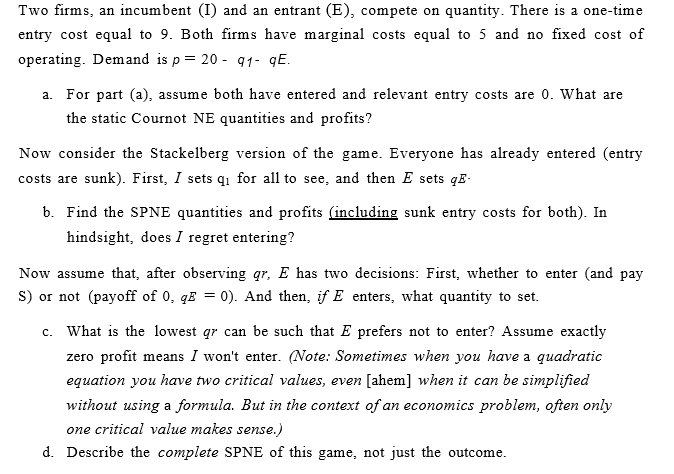Two firms, an incumbent (I) and an entrant (E), compete on quantity. There is a one-time entry cost equal to 9. Both firms have

Two firms, an incumbent (I) and an entrant (E), compete on quantity. There is a one-time entry cost equal to 9. Both firms have marginal costs equal to 5 and no fixed cost of operating. Demand is p = 20 - 91- qE. a. For part (a), assume both have entered and relevant entry costs are 0. What are the static Cournot NE quantities and profits? Now consider the Stackelberg version of the game. Everyone has already entered (entry costs are sunk). First, I sets q for all to see, and then E sets qE- b. Find the SPNE quantities and profits (including sunk entry costs for both). In hindsight, does I regret entering? Now assume that, after observing qr. E has two decisions: First, whether to enter (and pay S) or not (payoff of 0, qE = 0). And then, if E enters, what quantity to set. c. What is the lowest qr can be such that E prefers not to enter? Assume exactly zero profit means I won't enter. (Note: Sometimes when you have a quadratic equation you have two critical values, even [ahem] when it can be simplified without using a formula. But in the context of an economics problem, often only one critical value makes sense.) d. Describe the complete SPNE of this game, not just the outcome.
Step by Step Solution
3.44 Rating (160 Votes )
There are 3 Steps involved in it
Step: 1
a For the static Cournot NE we can use the standard Cournot model Demand p 2091 qE Marginal cost for ...
See step-by-step solutions with expert insights and AI powered tools for academic success
Step: 2

Step: 3

Ace Your Homework with AI
Get the answers you need in no time with our AI-driven, step-by-step assistance
Get Started


